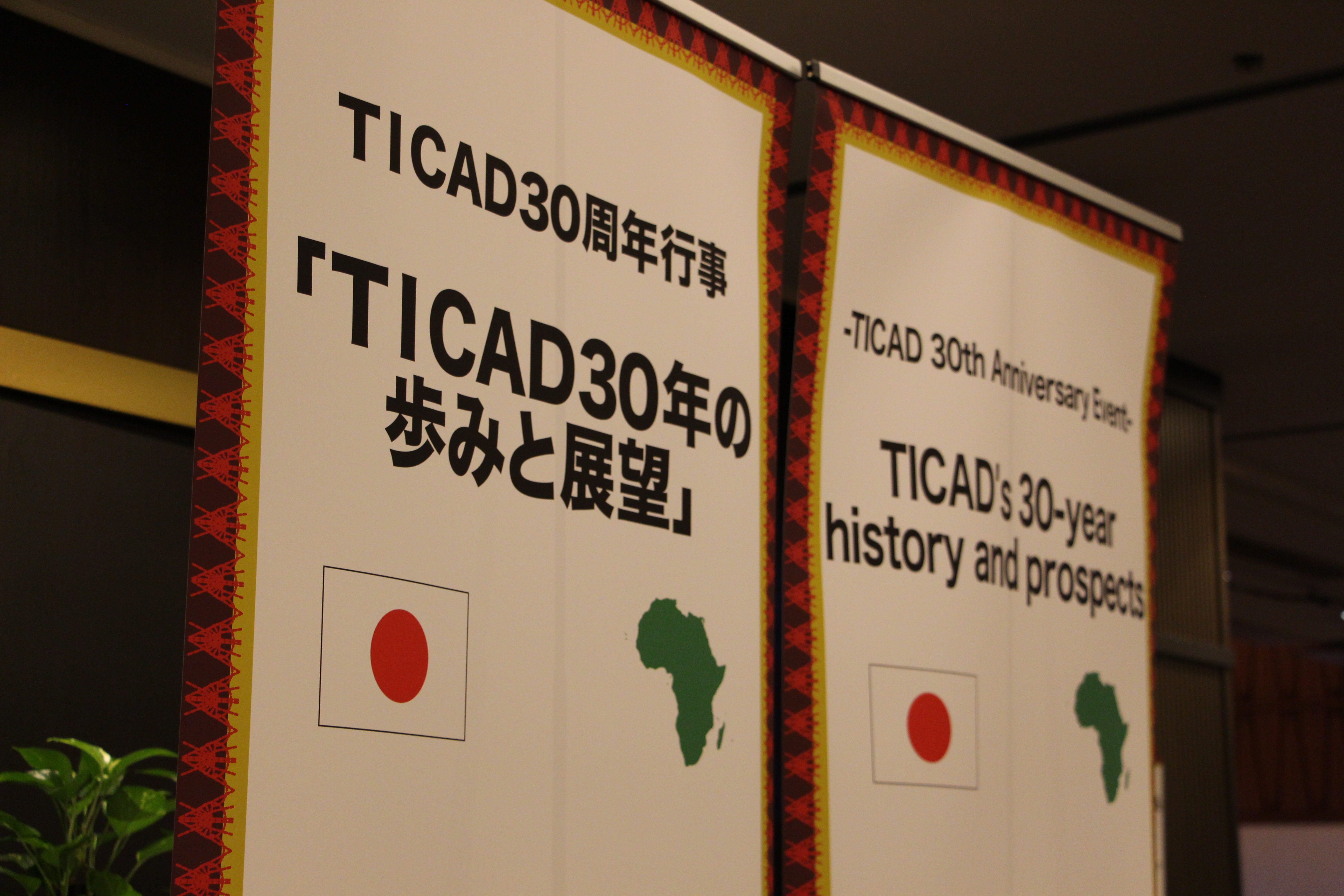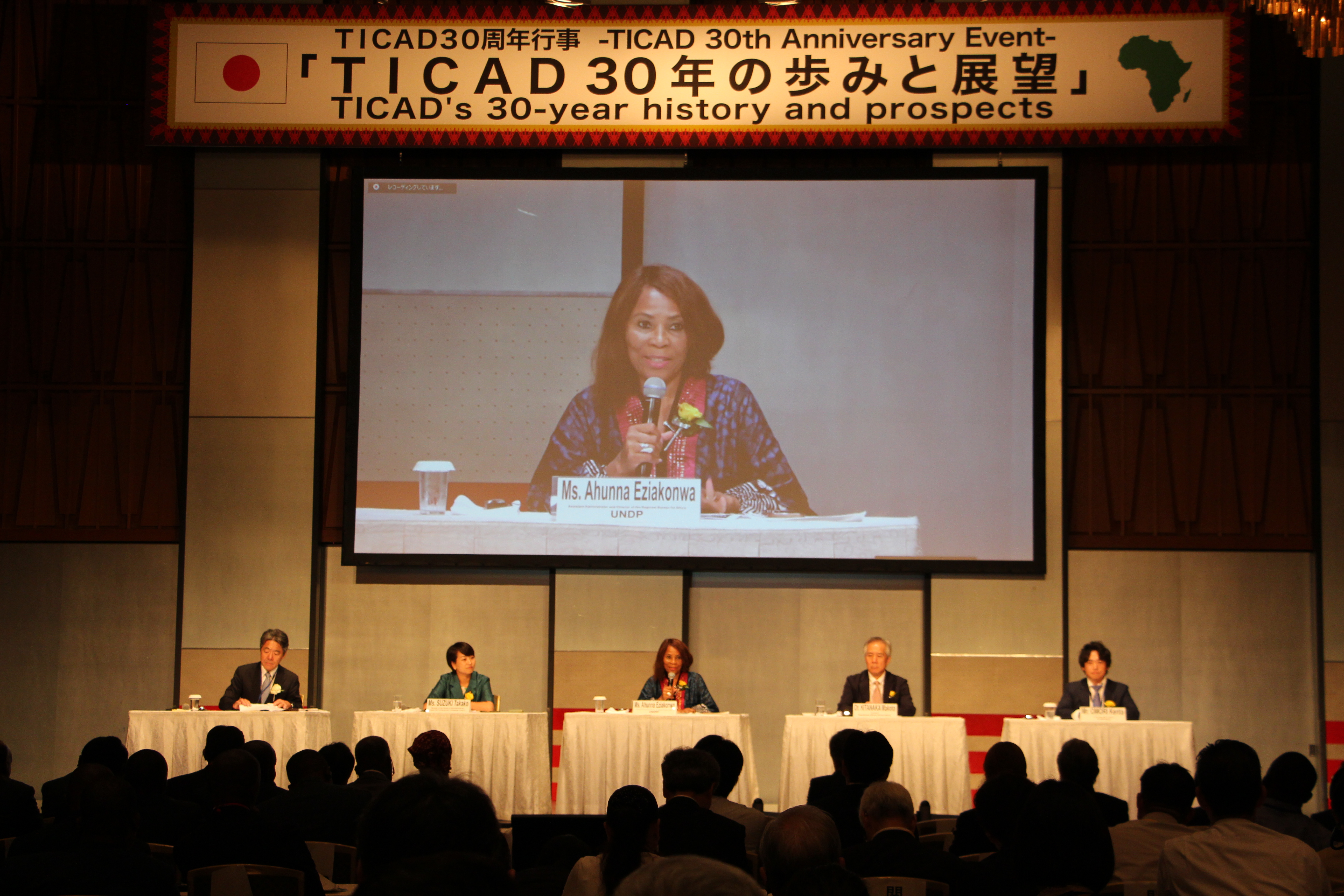On August 26, 2023, the Ministry of Foreign Affairs of Japan, with the support of the United Nations Development Programme (UNDP), organized the "TICAD 30th Anniversary Event: Reflecting on the Past and Looking Ahead." This event, designed to celebrate the achievements of TICAD over the past 30 years, featured discussions aimed at strengthening the future of TICAD and enhancing the partnership between Africa and Japan.
Celebrating 30 years of TICAD and looking to the future
November 10, 2023

The Tokyo International Conference on African Development (TICAD) has played a crucial role in promoting support and investment from Japan to Africa over its 30-year history. Since its inception in 1993, over US$100 billion has been provided in assistance through a mix of repayable and non-repayable financial aid, including Official Development Assistance (ODA), private investment, and development finance. The enduring partnership among Africa, Japan, and UNDP has been pivotal for sustainable development and international collaboration.
During the 30th-anniversary event held this summer, three panel discussions took place under the moderation of NHK commentator Shin Futamura. The event facilitated exchanges between Japanese and African stakeholders, including parliamentarians, embassy officials, businesses, NGOs, scholars, and local governments. The event saw 350 in-person participants and 243 online participants.
Panel 1: 30 Year’s history of TICAD
"TICAD was established at the end of the Cold War when global assistance to Africa was diminishing, serving as a platform for intellectual dialogue on Africa's development," highlighted Dr. Akihiko Tanaka, the President of the Japan International Cooperation Agency (JICA).
"Over the past three decades, Africa has collaborated with numerous countries. The continent's future hinges on a commitment to fairness, cooperation for peace, and judicious resource and energy diplomacy between Africa and Japan. African ownership of this process is key," stressed Mr. Estifanos Afeworki Haile, the Ambassador Extraordinary and Plenipotentiary at the Embassy of the State of Eritrea in Japan.
Mr. Yasuaki Yoneyama, the Special Representative in Japan for the World Bank, outlined the World Bank's position and its efforts to increase private investment in the coming years. He emphasized, "Since the inception of TICAD, ODA has significantly increased, but private investment has decreased due to the impact of the COVID-19 pandemic. Our goal is to eradicate extreme poverty and accelerate the growth of the African continent as the leading institution providing funds to sub-Saharan Africa."
The panel unanimously agreed that, compared to other development forums, TICAD is a pioneer with a strong brand value and a focus on compassion. Each partner is considered equal, with a unique emphasis on African ownership. While Africa continues to grapple with multifaceted challenges, TICAD offers opportunities for co-creation and agenda setting, especially in terms of resource management, which is essential for collective prosperity.

Panel 2: Evolution of TICAD from assistance to investment
"As the number of Japanese companies based in Africa continues to increase, the Japan External Trade Organization (JETRO) has placed business promotion at the center of its events and is collaborating with new actors, including venture capitalists and key players in Green and Blue Economies," as outlined by Dr. Katsumi Hirano, the Chief Senior Economist at the Japan External Trade Organization, during the second panel discussion.
Panelists emphasized the impact of Japanese investment on both physical and intangible infrastructure. Mr. Hajime Kawamura, the Chair of the Sub-Committee on Sub-Saharan Africa at Keidanren, pointed out, "As an economic organization with a large membership of companies in Japan, Keidanren has been focusing on digitalization to align with Agenda 2063 of the African Union."
Mr. Ken Shibusawa, the Chairman of the Global South Africa Committee of Keizai Doyukai, also highlighted initiatives in Africa such as the Impact Fund, addressing social challenges in emerging countries.
Mr. Kazuki Hondo, a Managing Executive Officer and Member of the Board at Nippon Export and Investment Insurance (NEXI), outlined, "NEXI insures against risks that arise in foreign transactions, which aren't covered by commercial insurance, and helps promote the overseas expansion of Japanese companies."
Discussions also revolved around decarbonization in Africa and worldwide, with an emphasis on the significance of the energy transition, private sector investment, and technology transfer. Mr. Hajime Wakuda, the President of the Japan Organization for Metals and Energy Security (JOGMEC), explained JOGMEC's efforts to assist in monitoring mining-related environments using remote sensing technology. Additionally, JOGMEC is actively engaged in five Joint Venture Exploration Projects in countries rich in mineral resources, providing financial support to projects with elevated risks.
Ms. Enora Le Borgne, an ABE (African Business Education) Initiative student, emphasized how she and her peers are striving to bridge the gap between Africa and Japan. Panelists highlighted the importance of mutual information sharing and collaboration, especially to establish the local context.
They all agreed that TICAD should serve as an interface and platform to share knowledge between African and Japanese enterprises.
Panel 3: Future of TICAD
The final panel, focusing on the future of TICAD, brought together high-level speakers to discuss the role that TICAD and Japan should play in the coming years.

Eziakonwa addresing her speach
Ms. Takako Suzuki, a Member of the House of Representatives at the Japan-African Union (AU) Parliamentary Friendship League, emphasized the importance of strategically leveraging TICAD, stating, "By strategically utilizing TICAD, Japan can garner support for initiatives promoted on the international stage, listen to needs, secure ODA budgets, and strengthen measures to promote private investment in Africa. Strengthening the roles of relevant ministries and public institutions for TICAD9 presents significant opportunities.
Ahunna Eziakonwa, the Assistant Administrator and Director of the Regional Bureau for Africa at UNDP, emphasized the significant progress Africa has made in moving away from aid dependence and towards democratization, thanks to the presence of AfCFTA. She highlighted TICAD's history of promoting high-quality growth, ranging from green investments to public health and regional stabilization.
She highlighted TICAD's history of promoting high-quality growth, spanning green investments, public health, and regional stabilization. Stressing the enduring partnership among Africa, Japan, and UNDP, she called for reframing development finance, consistent investment in resilience, and prioritizing structural economic transformation and regional integration.
Eziakonwa also urged a change in perceptions and narratives about Africa, especially among Japanese youth. She emphasized, "Japan's youth should understand Africa as a continent with strength and resilience, inhabited by outstanding individuals shaping their destinies. The goal is not to save Africa but to co-create a future with Africa. This transformed perspective is crucial in changing approaches to Africa."
The panel emphasized the importance of maintaining African ownership, involving actors from multiple sectors. Dr. Makoto Kitanaka, the President of Sasakawa Africa Association, an international NGO working with African smallholder farmers, highlighted the need for regenerative agriculture, nutrition-sensitive agriculture, and market-oriented agriculture. Mr. Kenta Omori, a Chief Operations Officer at STANDAGE Inc., discussed the issue of cross-border trade and how Standage is providing a new trade settlement system, facilitating simultaneous electronic transfers of goods and payments.
The speakers unanimously agreed that TICAD should be rooted in Africa's vision, plans, and global development frameworks. They emphasized the essential nature of investing in people and highlighted that co-creation with Africa is crucial for the future of both the continent and TICAD.

 Locations
Locations


